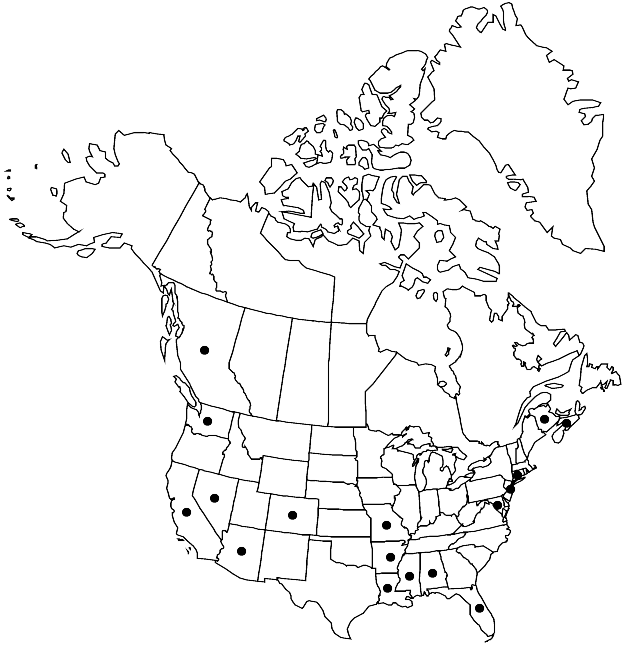Gemmabryum subapiculatum
Phytologia 87: 68. 2005.
Plants small, green or yellow-green, often with reddish tinge. Stems 0.5–1 (–2) cm; rhizoids brown or redbrown. Leaves loosely set, broadly lanceolate, ovatelanceolate, or narrowly ovate, weakly concave, 0.4–1.5 (–2) mm; base not decurrent; margins plane to revolute proximally, serrulate distally, limbidium absent; apex acute to acuminate; costa short-excurrent, awn slender, redbrown; alar cells similar to adjacent juxtacostal cells; proximal laminal cells abruptly short-rectangular, 2–3: 1; medial and distal cells 40–60 × 10–12 (–14) µm, 3–5: 1. Specialized asexual reproduction by rhizoidal tubers, on long rhizoids in soil or occasionally at stem base, bright red, spheric, 150–300 µm, cells 25–50 µm, smooth. Sexual condition dioicous. Capsule inclined or nutant, 2–3 mm.
Phenology: Capsules mature Apr–Jun (spring–summer).
Habitat: Disturbed dry to damp soil, soil over siliceous rock, agricultural fields
Elevation: low to high elevations (0-2000 m)
Distribution

B.C., N.B., N.S., Ala., Ariz., Ark., Calif., Colo., Conn., Fla., La., Md., Miss., Mo., Nev., N.J., Wash., w Eurasia, Atlantic Islands (Iceland), Pacific Islands (New Zealand), Australia
Discussion
Gemmabryum subapiculatum is the most common member of sect. Tuberibryum in North America. The species concept is broad to allow for collections that do not fit in other species and also vary greatly throughout their distribution. More work is needed to determine if additional microspecies exist within the species in the broad sense. Large, bright red, spheric tubers with smooth cells, short-excurrent costa, and rectangular proximal laminal cells are diagnostic.
Selected References
None.
Lower Taxa
"narrower" is not a number."narrow" is not a number."um" is not declared as a valid unit of measurement for this property.